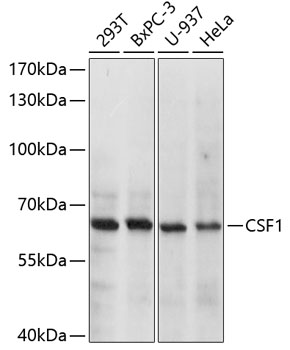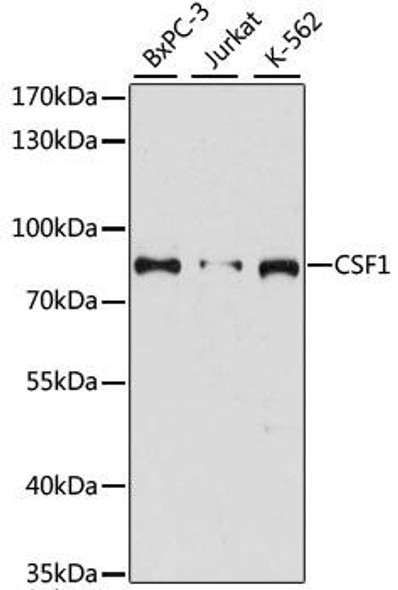Immunology Antibodies 1
Anti-CSF1 Antibody (CAB10854)
- SKU:
- CAB10854
- Product Type:
- Antibody
- Reactivity:
- Human
- Host Species:
- Rabbit
- Isotype:
- IgG
- Antibody Type:
- Polyclonal Antibody
- Research Area:
- Immunology
Description
| Antibody Name: | Anti-CSF1 Antibody |
| Antibody SKU: | CAB10854 |
| Antibody Size: | 100uL |
| Application: | WB IHC IF FC |
| Reactivity: | Human |
| Host Species: | Rabbit |
| Immunogen: | A synthetic peptide of human CSF1 |
| Application: | WB IHC IF FC |
| Recommended Dilution: | WB 1:500 - 1:1000 IHC 1:50 - 1:200 IF 1:20 - 1:50 FC 1:20 - 1:50 |
| Reactivity: | Human |
| Positive Samples: | 293T, BxPC-3, U-937, HeLa |
| Immunogen: | A synthetic peptide of human CSF1 |
| Purification Method: | Affinity purification |
| Storage Buffer: | Store at -20'C. Avoid freeze / thaw cycles. Buffer: PBS with 0.02% sodium azide, 50% glycerol, pH7.3. |
| Isotype: | IgG |
| Sequence: | Email for sequence |
| Gene ID: | 1435 |
| Uniprot: | P09603 |
| Cellular Location: | Cell membrane, Secreted, Single-pass type I membrane protein, extracellular space |
| Calculated MW: | 29kDa/47kDa/60kDa |
| Observed MW: | 60kDa |
| Synonyms: | CSF1, CSF-1, MCSF |
| Background: | The protein encoded by this gene is a cytokine that controls the production, differentiation, and function of macrophages. The active form of the protein is found extracellularly as a disulfide-linked homodimer, and is thought to be produced by proteolytic cleavage of membrane-bound precursors. The encoded protein may be involved in development of the placenta. Alternate splicing results in multiple transcript variants. |
| UniProt Protein Function: | M-CSF: Cytokine that plays an essential role in the regulation of survival, proliferation and differentiation of hematopoietic precursor cells, especially mononuclear phagocytes, such as macrophages and monocytes. Promotes the release of proinflammatory chemokines, and thereby plays an important role in innate immunity and in inflammatory processes. Plays an important role in the regulation of osteoclast proliferation and differentiation, the regulation of bone resorption, and is required for normal bone development. Required for normal male and female fertility. Promotes reorganization of the actin cytoskeleton, regulates formation of membrane ruffles, cell adhesion and cell migration. Plays a role in lipoprotein clearance. Aberrant expression of CSF1 or CSF1R can promote cancer cell proliferation, invasion and formation of metastases. Overexpression of CSF1 or CSF1R is observed in a significant percentage of breast, ovarian, prostate, and endometrial cancers. Aberrant expression of CSF1 or CSF1R may play a role in inflammatory diseases, such as rheumatoid arthritis, glomerulonephritis, atherosclerosis, and allograft rejection. 3 isoforms of the human protein are produced by alternative splicing. |
| UniProt Protein Details: | Protein type:Cytokine; Membrane protein, integral Chromosomal Location of Human Ortholog: 1p13.3 Cellular Component: extracellular space; perinuclear region of cytoplasm Molecular Function:cytokine activity; growth factor activity; macrophage colony stimulating factor receptor binding; protein binding; protein homodimerization activity Biological Process: macrophage differentiation; osteoclast differentiation; positive regulation of cell migration; positive regulation of cell proliferation; positive regulation of cell-matrix adhesion; positive regulation of cellular protein metabolic process; positive regulation of macrophage differentiation; positive regulation of monocyte differentiation; positive regulation of mononuclear cell proliferation; positive regulation of osteoclast differentiation; positive regulation of protein kinase activity; reproductive developmental process; transmembrane receptor protein tyrosine kinase signaling pathway |
| NCBI Summary: | The protein encoded by this gene is a cytokine that controls the production, differentiation, and function of macrophages. The active form of the protein is found extracellularly as a disulfide-linked homodimer, and is thought to be produced by proteolytic cleavage of membrane-bound precursors. The encoded protein may be involved in development of the placenta. Alternate splicing results in multiple transcript variants. [provided by RefSeq, Sep 2011] |
| UniProt Code: | P09603 |
| NCBI GenInfo Identifier: | 311033367 |
| NCBI Gene ID: | 1435 |
| NCBI Accession: | P09603.2 |
| UniProt Secondary Accession: | P09603,Q13130, Q14086, Q14806, Q5VVF3, Q5VVF4, Q9UQR8 A8K6J5, |
| UniProt Related Accession: | P09603 |
| Molecular Weight: | 29,215 Da |
| NCBI Full Name: | Macrophage colony-stimulating factor 1 |
| NCBI Synonym Full Names: | colony stimulating factor 1 |
| NCBI Official Symbol: | CSF1 |
| NCBI Official Synonym Symbols: | MCSF; CSF-1 |
| NCBI Protein Information: | macrophage colony-stimulating factor 1 |
| UniProt Protein Name: | Macrophage colony-stimulating factor 1 |
| UniProt Synonym Protein Names: | Lanimostim |
| Protein Family: | Macrophage colony-stimulating factor |
| UniProt Gene Name: | CSF1 |
| UniProt Entry Name: | CSF1_HUMAN |







